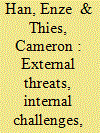| Srl | Item |
| 1 |
ID:
170376


|
|
|
|
|
| Summary/Abstract |
This paper empirically tests bellicist theories of state building in the East Asian context, paying attention to the interplay between external threats and internal challenges and their implications for these states’ extractive power. How much variation in state building in the region can be attributed to war and war preparation as a result of both external threats and internal challenges? In particular, it provides more fine-grained analysis on the different types of internal challenges and their impact on state capacity building. The article argues that in the East Asia region, both external threats and internal challenges are crucial to explaining the variation in state capacity across the region. However, we also find that different types of internal challenges have different effects. Particularly, communist insurgencies seem to have both an immediate and long-term positive effect in compelling the state to respond with more extraction to engage in state-building efforts.
|
|
|
|
|
|
|
|
|
|
|
|
|
|
|
|
| 2 |
ID:
095387


|
|
|
|
|
| Publication |
2010.
|
| Summary/Abstract |
The European state-building experience has led many scholars to argue that war forces states to increase their fiscal-administrative capacity, or what we might refer to as political development, in order to compete in the international system. War also requires states to generate wealth to support such competition, which should lead to progressively increased levels of economic development. Yet, in contemporary empirical studies, war is often studied as a dependent variable, with economic and political development modeled as affecting its origination. This reading of theory and empirical work suggests that war, economic development, and political development constitute an endogenous system. In this paper, we develop expectations about how these three processes interact and test them using a three-stage least squares regression model. The results show significant simultaneous relationships between the three processes. We conclude that war, economic development, and political development are mutually constitutive processes in the contemporary international system.
|
|
|
|
|
|
|
|
|
|
|
|
|
|
|
|